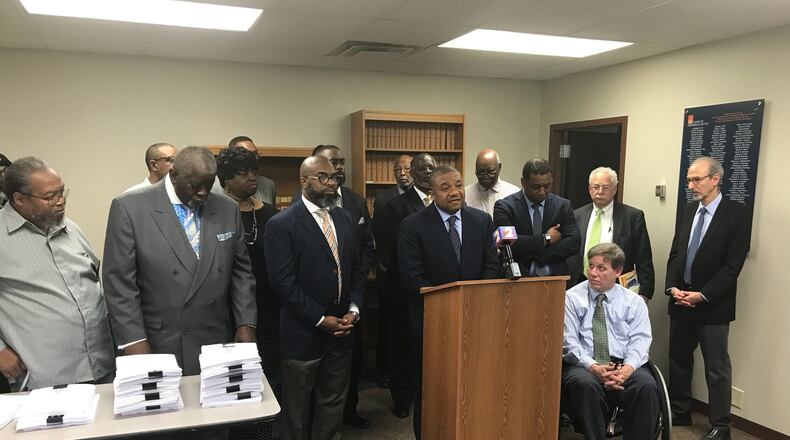The complaint states the closing of the hospital at 2222 Philadelphia Drive will “have a discriminatory and separate adverse impact on African Americans and women” in violation of the Civil Rights Act and the Affordable Care Act.
RELATED: Premier Health to close Good Samaritan Hospital in Dayton
“We ask that Premier Health take us very, very seriously, because even though it seems monumental, we will not stop. Even though it seems impossible we will not quit,” said the Rev. Rockney Carter, president of the newly formed Clergy Community Coalition, which filed the complaint.
Premier Health said in a statement that the health system is “committed to providing care for everyone in our community, just as we have done for more than 125 years. We are in the process of reviewing the complaint and, therefore, cannot make any specific comments on it.”
The decision to close the hospital, one of the last anchor institutions on the city’s west side, has received push back from residents and city leaders concerned about the loss of not only access to medical services like the emergency department, but also the loss of the 1,600 main campus jobs that will be transferred to other facilities within the health system.
Rockney and the other west side clergy that filed the lawsuit have previously criticized the decision, saying it will disproportionately affect black residents' access to jobs and health services. That population already has higher unemployment rates and worse average health outcomes on key measures like infant mortality, the group says.
RELATED: Five Rivers Health Center on Good Sam campus says it’s here to stay
The health network’s leaders have said the high number of empty beds and the high cost of maintaining an inefficient and out-of-date facility were among the factors guiding the decision to close the hospital.
The city of Dayton has a declining population, a declining birth rate and people are generally staying in hospitals less as technology lets procedures shift from inpatient to outpatient.
Premier has also previously said that patients and employees from the neighborhoods around Good Samaritan area are already coming to its other hospital in the city, Miami Valley Hospital, which shows there will still be access to hospital jobs and services.
Rockney announced the complaint filing from the downtown Dayton office of Advocates for Basic Legal Equality, which is the legal team representing the clergy. ABLE is also joined by three separate attorneys: Michael Wright, Aaron Durden and Laurence Lasky.
Rockney said the group is not only speaking out of concern about medical services leaving West Dayton but also the economic impact of the ongoing pattern of shrinking investment on the west side.
“If we don’t stand and speak up now we might as well pack it in, because the intentional disinvestment is going to detrimentally impact us across businesses, across medical services,” said Rockney, who is also pastor at Zion Baptist Church.
RELATED: ‘Bad news’ for the city: 7 reactions to Good Samaritan Hospital’s closure
The Office of Civil Rights will first determine if it has the legal authority to investigate the complaint. If it moves forward after that review, investigators will gather more information and eventually issue a decision on whether civil rights have been violated, according to the office’s bylaws.
If the office determines that residents have had their civil rights violated, the hospital would be forced take corrective action or risk enforcement proceedings that could mean a loss of federal funding, according to the attorneys in the case.
The complaint states that under federal health laws administered by HHS, a policy can violate civil rights even if the policy is not intentionally designed to violate civil rights.
“The Supreme Court has repeatedly held that Title IV regulations validly prohibit practices having a discriminatory effect on protected groups, even if the actions or practices are not intentionally discriminatory,” the complaint states.
Two census tracks most aligned with Good Samaritan are 85 percent African American, the complaint says.
Also, Good Samaritan is the closest hospital for 38,600 people in the area — 75 percent of them African American, according to a study of travel times by the Kirwan Institute at Ohio State University.
REPORTED: West Dayton pastors urge boycott of Good Sam forums
Debra Lavey, an attorney with ABLE, said a similar civil rights complaint was filed in 2009 against University of Pittsburgh Medical Center over the planned closure of a hospital in a primarily black service area, The hospital never reopened, but after the complaint was filed, an agreement was reached between the hospital and HHS that resulted in support for a transportation service to another facility, and an expansion of primary care services and hours. However, community members have been critical of the plan's implementation, saying the expanded hours ended after a few years, and those close to the former hospital still have problems with access to health care.
Ellis Jacobs, another attorney with ABLE, said the Pittsburgh case can be instructive as the group moves forward.
“There are things to be learned from it,” he said.
About the Author
